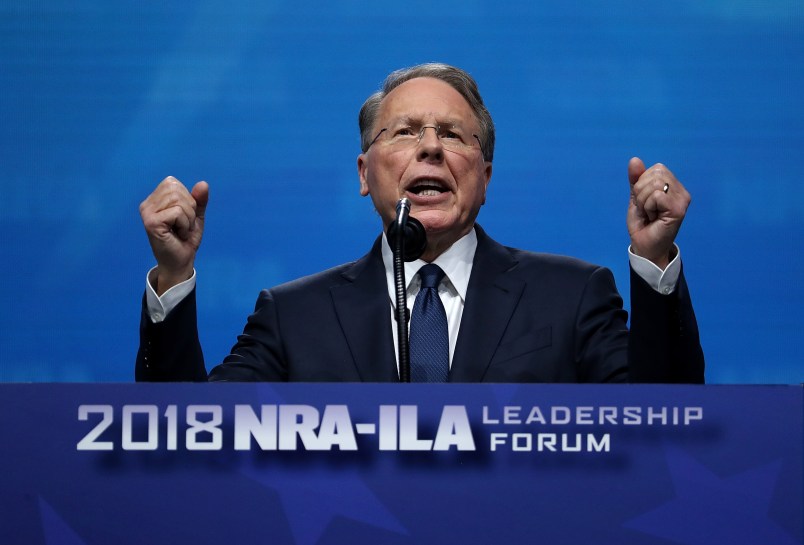The National Rifle Association could be in deep trouble.
A wide-ranging investigation into the NRA announced this weekend by New York State Attorney General Letitia James threatens the very existence of the organization, experts in non-profit law told TPM.
James has the power to ask a judge to dissolve the gun-rights group if she finds evidence that the board engaged in serial violations of New York state charity law, as her office did with the Donald J. Trump Foundation. Lesser remedies available could see James remove individual members from the NRA board and require that restitution be paid out to any parties harmed by the self-dealing that allegedly occurred.
The Democratic attorney general’s office confirmed to TPM that it had issued subpoenas in connection with a probe into the NRA. The Wall Street Journal reported that the probe focuses on possible self-dealing within the organization, misstatements on the non-profit’s regulatory filings, and “unauthorized political activity.”
James’ investigation has raised the stakes for an NRA already grappling with allegations of decades of fiscal mismanagement and insider deals between top executives and higher-ups at the NRA’s longtime ad firm, Ackerman McQueen.
The NRA sued Ackerman this month, claiming that the Oklahoma City-based company is refusing to hand over documents it needed to inspect the pair’s financial relationship.
Where the attorney general is digging
Chartered in 1871 in New York State as a marksmanship group, the NRA has remained under the same charter in the state’s bureau of charities even as it morphed into the ferocious gun rights group we know today.
Experts told TPM that the political activity prong of the probe could be the most serious for the non-profit.
“The political activity allegation, if it can be established, would be a clearer route to the removal of directors or key employees, officers, and, if it were flagrant enough, the dissolution of the organization,” Sean Delany, Executive Director of the Lawyer’s Alliance for New York and a former Assistant Attorney General overseeing the Charities Bureau at the Attorney General of the State of New York, told TPM.
Part of the issue goes to James’ powers as attorney general.
Marcus Owens, a former IRS official in charge of tax-exempt organizations, told TPM that while the IRS would decide on the group’s tax-exempt status, James has “pretty broad authority to step in and ensure that the organization has been complying with the rules for charities in New York.”
Those rules include a ban on activities that go beyond the charity’s purpose — in the NRA’s case, partisan political contributions and activities. The NRA has an affiliate called the Institute for Legislative Action that directly engages in lobbying.
Owens added that if James finds evidence that the NRA “has morphed into some kind of lobbying or political group and not necessarily a charity as New York law would define it,” that could give the attorney general more leeway to move from allegations around the misuse of money to the existence of the NRA itself.
Separate allegations of insider dealing could be harder to pin down. But, if investigators find that NRA boards failed to vet deals made with companies linked to NRA directors — as recent reporting suggests — then the group could find itself in further legal hot water.
Eric Gorovitz, a non-profit attorney who formerly worked at the Coalition To Stop Gun Violence, told TPM that “LaPierre, Oliver North, all the senior management and the directors, the foundation managers of the organization are within reach.”
North was ousted as president of the NRA over the weekend.
What James can do with what she finds
The most extreme remedy available to James would be dissolving the NRA.
The Wall Street Journal reported that the NRA’s outside counsel told the group to brace for a “dissolution action” by James.
To do that, James would have to prove to a judge that a pattern of either financial wrongdoing or political activity had ingrained itself so deeply at the NRA that no other remedy would be suitable.
Owens said that a dissolution request would likely take the form of “a combination of pointing to abuse, financial abuse by insiders, if that exists, plus related-party business transactions that allowed those who were not insiders to siphon money off….or it could be that the attorney general takes the position that its more like a trade association” acting for the political benefit of gun manufacturers.
Less dramatic remedies, like removing individual board members or mandating that the NRA institute tighter conflict of interest policies, are more likely.
Those actions would be oriented towards improving how the NRA handles money and making it a more effective organization.
“Stepping aside from which organization we’re talking about, you don’t want to harm the charity in its function, you want to focus on the bad actors,” Delany said.
“The point is not to injure the charity because of what individual bad actors do.”






